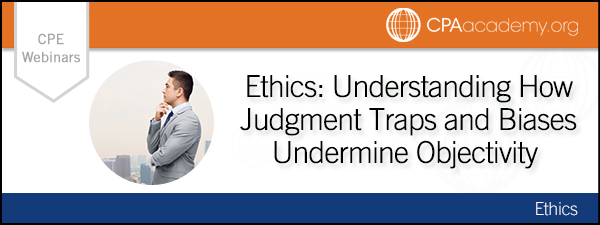
This Ethics webinar does NOT qualify for IRS CE credit.
CPA - small firm
CPA - medium firm
CPA - large firm
The ability to exercise effective decision making and maintain objectivity on a consistent basis is a difficult task even for those who have the necessary desire and expertise. Further, objectivity is a key feature of the AICPA’s Code of Professional Conduct. Researchers in a variety of disciplines, including economics and psychology, have applied a scientific approach to studying decision making and objectivity over the past 35 years. From this body of knowledge, experts in psychology and cognition now understand that we are all “hard-wired” to fall into a set of predictable, systematic judgment and decision traps and biases. Fortunately, through an awareness of the common pitfalls, and through an understanding of effective decision processes based in cognitive psychology, research suggests that people can significantly improve the objectivity with which they make judgments and decisions.
-
A practical approach to maintaining and enhancing objectivity and excellent decision-making.
-
Understanding of common traps and biases: e.g., decision triggers, rush to solve, anchoring, motivated reasoning, availability, etc., all based in cognitive psychology.
-
Know how proactively reframing judgments is a central characteristic of those who are widely respected as good thinkers and decision makers in organizations and why people don’t do it.

Doug F. Prawitt, Ph.D., CPA
Doug Prawitt, Ph.D., CPA and William Tayler, Ph.D. CMA
Professor
prawitt@byu.edu
(801) 422-2351
Doug earned his Ph.D. at the University of Arizona and is the LeRay McAllister/Deloitte Professor of Accountancy at Brigham Young University. His research and teaching in BYU’s graduate accounting and MBA programs focus on auditing and professional judgment. Doug’s research has been published in premier academic journals, including The Accounting Review, Journal of Accounting Research, Contemporary Accounting Research, Organizational Behavior & Human Decision Processes, Auditing: A Journal of Practice & Theory, Behavioral Research in Accounting, and others. He has also published award-winning articles in the Journal of Accountancy, Internal Auditor, and CPA Journal and has co-authored two leading auditing textbooks. Doug has won several research, teaching, and "best research paper" awards, as well as BYU’s 2006 Award for Distinction in Graduate Education, the Auditing Section’s 2014 Innovation in Auditing and Assurance Education Award, the 2013 AAA/Deloitte Wildman Medal Award recognizing the publication over five years most likely to impact the public accounting profession positively, the 2016 BYU Marriott School Outstanding Faculty Award, and the 2016 AAA Outstanding Accounting Educator Award. Doug has chaired BYU’s equivalent of a faculty senate and BYU’s university-level promotion and tenure committee. He is active in the profession, having served a three-year term as a member of the AICPA’s Auditing Standards Board. He currently serves as a COSO’s Executive Board member, which just released a substantive revision of its landmark 2004 Enterprise Risk Management—Integrated Framework. Doug has served as an expert witness in high-profile auditing litigation cases. He has consulted with various large and small professional services firms on issues ranging from materiality and audit sampling to analytical procedures and professional judgment.

William Tayler, Ph.D., CMA
Brigham Young University
Professor
tayler@byu.edu
(801) 422-5972
Bill earned his Ph.D. and master’s degrees at Cornell University and is the Warnick Deloitte Touche Fellow and a professor of accountancy at Brigham Young University, one of the top-ranked accounting programs in the world. Bill is an internationally renowned researcher on the judgment and decision-making of accounting and business professionals. He has presented his research as an invited speaker at universities and scientific conferences worldwide and has won several research awards. Bill has also taught at Cornell University and Emory University, and in BYU’s Executive MBA program, and has received multiple teaching awards. Bill is a Certified Management Accountant specializing in performance measurement, the assignment of decision rights, and incentive compensation. His work has been published in top research journals, including Accounting Horizons, Accounting, Organizations and Society, The Accounting Review, Journal of Accounting Research, Journal of Behavioral Finance, Journal of Finance, Review of Financial Studies, and Strategic Finance, and he is a co-author on two popular accounting textbooks. Bill currently serves on the editorial boards of The Accounting Review, Management Accounting Research, and Accounting, Organizations, and Society, and as a director of the Institute of Management Accountants Research Foundation.







